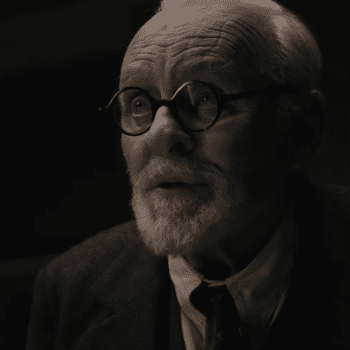I get it in concept. Christianity’s all about grace and forgiveness: Together, the words are mentioned in the New Testament about 160 times (give or take a few, depending on the translation). I think most of us know how important it is to forgive, and so we try to do it as much as we’re able.
But when it comes to forgiving ourselves … that can be a lot more difficult. At least it can be for me.
I wonder if one of the reasons I like Batman so much is both of us have highly developed guilt complexes. Seems I’m always feeling guilty about something, even something that happened 20 or 30 years ago. I remember almost every time I blew someone off or said the exact wrong thing … and I have a hard time letting those moments go, even when the friends and family members I hurt like that have long ago forgiven and, sometimes literally, forgotten.
But I can’t forget. And so I pull out my guilt and shame and rub my face in it year after year.
The Divergent Series: Insurgent isn’t a great movie. It’s inconsistent and, at times, wholly illogical. But when Insurgence focuses on the idea of guilt—specifically Tris’ own inability to forgive herself—this movie becomes surprisingly powerful.
Let’s back up a little before we get into this spoiler-laden essay:
The Divergent Series is set in a dystopian version of Chicago, wherein the remnants of society have been split into factions: Abnegation are folks inclined toward selflessness; Amity toward peace; Candor toward truth-telling, Dauntless toward bravery and derring-do; and Erudite toward intelligence. But there are people, like Tris (Shailene Woodley), who don’t comfortably fall into any one category. They are Divergent. And because Divergents can’t be categorized, they can’t be controlled in this regimented world. And that, some argue, make them a threat to these last threads of civilization.
When Insurgent opens, Tris, her boyfriend Four (Theo James) and a few other societal refugees are holed up in the Amity outpost—a rural paradise that exudes a hippy love-and-peace vibe. They’re relatively safe, but even so Tris has ongoing nightmares about her mother and father, about the people she couldn’t save … even the people who she had to kill. Loathing fills her—some of it directed at Erudite’s villainous leader Jeanine (Kate Winslet) and her ilk, but a large reservoir reserved for herself. She’s being eaten alive from the inside out, and Amity leader Johanna (Octavia Spencer) sees that hatred and guilt oozing out of her like sweat.
“To be Amity is to forgive others … and yourself,” Johanna tells her.
 But she can’t, of course. Even though we viewers know her story and see precious little that needs to be forgiven, Tris doesn’t see it that way. In her mind, she’s let people die. She even killed one of her best friend’s boyfriends. (The fact that said boyfriend was trying to kill her at the time is beside the point.) She carries all the guilt and shame inside her, refusing to let it out and keeping it hidden from anyone who might ask about it. Sounds familiar to me. Maybe to a lot of us. But there is a way out, and the movie outlines a surprisingly biblical way forward.
But she can’t, of course. Even though we viewers know her story and see precious little that needs to be forgiven, Tris doesn’t see it that way. In her mind, she’s let people die. She even killed one of her best friend’s boyfriends. (The fact that said boyfriend was trying to kill her at the time is beside the point.) She carries all the guilt and shame inside her, refusing to let it out and keeping it hidden from anyone who might ask about it. Sounds familiar to me. Maybe to a lot of us. But there is a way out, and the movie outlines a surprisingly biblical way forward.
Confession
What’s the first step in having one’s sins forgiven? Confess those suckers. Protestant and evangelical Christians like me don’t often make a big deal out of confession, and sometimes, I think we downplay it way too much. When you read the Bible, it’s a big deal. And Tris undergoes a forced confession in, appropriately enough, the halls of Candor.
When she and Four arrive, leader Jack Kang (Lost vet Daniel Dae Kim) is inclined to turn these two rebels over to Jeanine. But Four suggests they undergo their trial here, at Candor headquarters. They’re injected with a truth serum that’ll inflict pain if they lie or hold something back—a reflection of us, too, when we refuse to confess the guilts eating away at our insides. “May the truth set you free,” Kang says, echoing John 8:32. And indeed, they do go free—at least physically. But Tris’ friend isn’t so ready to forgive right away, and frankly, neither is Tris willing to forgive herself. Maybe her secret shame is out in the open, but that makes her feel worse, not better. Still, she’s at a point where healing can begin.
It’s not easy, of course—not in this dystopian world.
Penance
If protestant evangelicals downplay confession a little, they don’t do hardly anything with the idea of penance. And theologically, I get that: God forgives us without any strings. But here’s the thing: I think sometimes we need to perform penance not for God, but for ourselves. Grace can feel too easy sometimes.
When Jeanine learns that Tris feels so responsible for people in her sphere—and so guilty when they die—Jeanine triggers some sort of mind-control device that causes some of her associates to kill themselves … unless Tris gives herself up. And Tris, not wanting any other lives on here conscience, marches right into Erudite headquarters and does just that. It’s a Christ-like act of self-sacrifice, of course, but Tris is no blameless, sinless lamb. She feels guilty. She feels like a sinner. And so, in Jeanine’s virtual reality chamber, Tris undergoes what could be her fatal penance.
 There’s an interesting element in this penance. In the Bible, Satan often serves as our accuser (his name means “adversary” in Hebrew)—our adversarial prosecuting attorney before God, if you will, arguing that we’re slimy and worthless. In Zechariah, we read that Satan stands at God’s right hand, ready to accuse Joshua. And in Revelation 12, we read about how our accuser has been “thrown down.” Jeanine, Tris’ own personal adversary—the devil with the blue dress, if you will—serves this function in Insurgent. She throws Tris’ own guilt and shame back in her face and argues that all she’s fought for is for naught. “Your mother’s death, just like your boyfriend’s death, will mean absolutely nothing,” she says. Locking Tris in her own personal hell, she throws up nightmare after nightmare, pulled from Tris’ own fears and longings and guilt.
There’s an interesting element in this penance. In the Bible, Satan often serves as our accuser (his name means “adversary” in Hebrew)—our adversarial prosecuting attorney before God, if you will, arguing that we’re slimy and worthless. In Zechariah, we read that Satan stands at God’s right hand, ready to accuse Joshua. And in Revelation 12, we read about how our accuser has been “thrown down.” Jeanine, Tris’ own personal adversary—the devil with the blue dress, if you will—serves this function in Insurgent. She throws Tris’ own guilt and shame back in her face and argues that all she’s fought for is for naught. “Your mother’s death, just like your boyfriend’s death, will mean absolutely nothing,” she says. Locking Tris in her own personal hell, she throws up nightmare after nightmare, pulled from Tris’ own fears and longings and guilt.
But Tris conquers each in turn before the end, when she must face … herself. Her anger and self-loathing, her guilt and shame. She must find grace—not for her betrayers or abusers, not for Jeanine or her Judas-like Peter or her turncoat brother Caleb. To forgive them might be easier. To forgive herself … that’s hard.
Forgiveness
In Veronica Roth’s original book Insurgent—a piece of dialogue not present in the movie—Tris and Johanna share the following conversation.
“May the peace of God be with you,” she says, her voice low, “even in the midst of trouble.”
“Why would it?” I say softly, so no one else can hear. “After all I’ve done…”
“It isn’t about you,” she says. “It is a gift. You cannot earn it, or it ceases to be a gift.”
In the movie, Tris figures out how to accept that gift, I think—to stop shaking her fist at her own sorry self and move on to a happier, healthier state. She beats Jeanine’s trials and walks out of her hell. Maybe, even in the midst of all the chaos in The Divergent Series, she can feel that peace Johanna mentioned. That grace.
It’s harder for me. Maybe harder for all of us. I used to think it was easy, but I know better now. I know God is gracious and forgiving. I can prattle on about the grace of God as well as anyone. I can believe that we can all be saved through that grace and forgiveness. I know it. But I don’t always feel it.
But to truly understand that grace, I think you have to be willing to show yourself a little grace … to not only forgive others as God forgave you, but forgive yourself, too. And honestly, I’m not sure I know how to do that very well.














